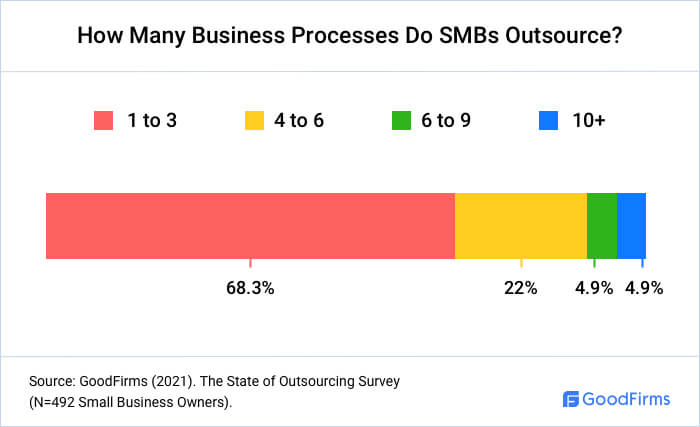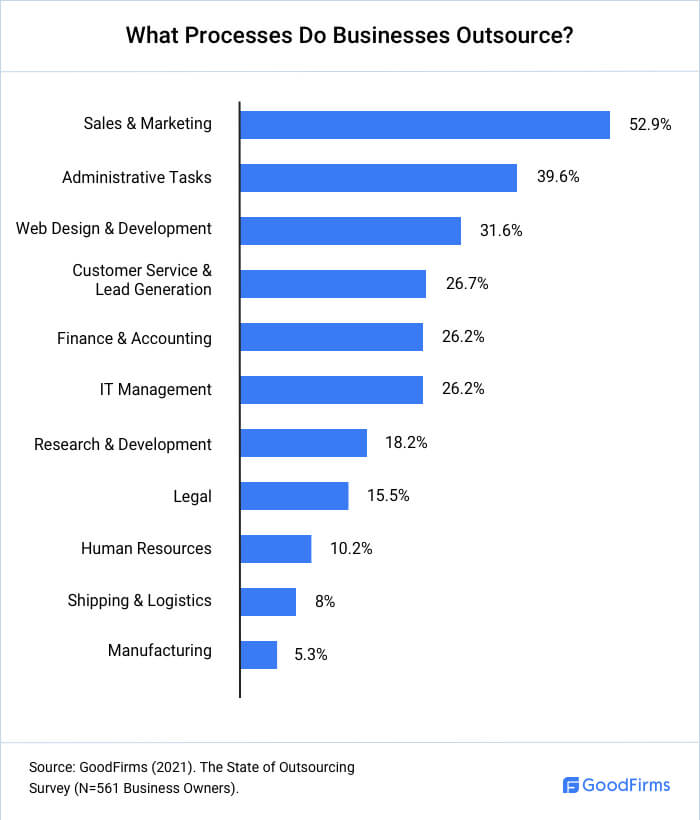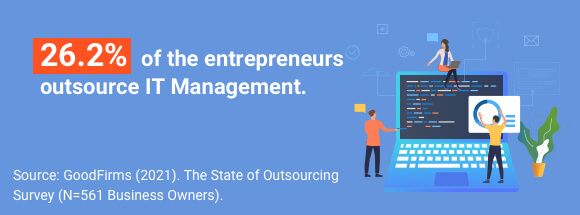Every business has to deal with plenty of tasks. Some are basic yet imperative, while others are more critical entrepreneurial activities. The key is in deciding what functions to execute in-house, what to outsource. When thoroughly planned, business process outsourcing works as an effective strategy to streamline costs, increase productivity, and escalate the time-to-market period.
Entrepreneurs can capitalize on their strengths by delegating various functions such as IT management, customer service, finance & accounting, human resources, sales, marketing, etc., to outsourcing companies.
However, selecting the perfect outsourcing partner that meets every requirement can be challenging. Companies have to consider several essential factors, right from identifying the gaps within a business structure to listing out clear expectations from the vendor. Ultimately, this will help them make an informed decision. Getting it wrong can add time and cost, damage customer relationships, and often even ruin the business.
Goodfirms surveyed 561 business owners worldwide to know the points SMBs need to consider while outsourcing and the mistakes that can prove fatal. Also, what and how many services they outsource to scale and expand.
How Many Business Processes Are SMBs Outsourcing?
Every business is different, their requirements are different, and so are their reasons for outsourcing. Some organizations might want to have round-the-clock operations, while some might want to reduce overhead costs. Others might wish to have access to expert resources. Entrepreneurs need to focus on what benefits of outsourcing they expect from the third-party providers.
Employing a specialized company for each type of service might seem like a reasonable approach. But it can raise issues like manageability and cost-effectiveness. Selecting and juggling between many providers takes much more time, slows project development, and might cause entrepreneurs to lose focus on their outsourced solutions.
Goodfirms research confirms that 67.9% of the surveyed business owners outsource 1 to 3 services, while 21.4% outsource 4 to 6 business functions.

Daniel Welch, Owner of Ideodyssey, is a professional creative and producer for 15 years. Yet, he regularly outsources to specialists for his clients, even for photography. He reasons, "A portrait photographer, food photographer, and product photographer each have different skill sets. My pictures of food will never be as good as someone who spends the majority of their time photographing food."
He believes that the specialists who work daily in the specific fields understand trends, standards, market shifts, story-telling, and timelines. They can work with a business owner to execute their brand's vision efficiently.
Daniel outsources projects that involve his weakest points or processes for which he lacks the time. He says, "I often outsource copywriting to one of my freelancers as well. They know how to take a paragraph of text and hone it to a single dynamic statement.
I'm preparing an upcoming store for small business merchandise, which means I'm hiring a product designer I know because I can't design a cool pint glass to save my life. I'm unable to execute graphic design ideas precisely as I see them in my head. I'm verbose when I should be terse. I don't have the time to engage on social media as I should."
What Business Processes Do SMBs Outsource?
SMBs might have to deal with several tasks simultaneously, like having to go through several new reports while contemplating due taxes, the payroll, or panicking over the crashed website. Having on-site employees for each of these functions might not be viable due to various reasons. As a result, entrepreneurs have to spend more time handling operational issues than growing their small business.
More and more businesses outsource several of their responsibilities to manage the demands and challenges that accompany the growth. Approximately 300,000 jobs are outsourced every year in the US.
Goodfirms research reveals that 52.9% of the business owners outsource their sales and marketing, followed by 39.6% partnering with the service providers for administrative tasks.

1) Sales & Marketing
An outsourced sales and marketing firm can expertly utilize various ways (both online and offline) to promote the products or services in a fiercely competitive online world. And to survive in the market, businesses regularly need to acquire new clients and retain the old ones. With years of experience in direct customer acquisition, the outsourced team supports businesses in creating efficient marketing campaigns, generating prospects, nurturing leads, and moving clients through the sales pipeline.
"52.9% of the surveyed experts outsource Sales and Marketing."
"One aspect of our business that we have outsourced, which most companies don't necessarily do, is our digital marketing. We use an outside firm to handle all of our PPC ads, social media, SEO, and other forms of marketing. For us, having an agency on retainer is much more flexible and affordable than having a full-time employee in-house," says John Ross, CEO at CPA Prep Insights.
John is satisfied that there is no loss in quality or disconnection between them and the agency. John adds, "They handle everything from end-to-end -- from coming up with the ad copy, to following up each month with performance reports. It is incredibly easy to outsource your digital marketing these days. There are tons of firms that specialize in this area and can offer everything from basic social media services, all the way up to massive cross-channel campaigns."
2) Administrative Tasks
A business administration is a process of overseeing the company's daily activities and creating long-term strategies. The administrative functions that can be assigned to an outsourcer are - research and data collection, document management and organization, travel arrangements, booking appointments with clients, managing calendars, compiling reports, transcribing audio or video, and many more. Over the last few years, the virtual assistance service has grown significantly worldwide.

"I first started outsourcing in 2013 when I was a real estate agent. I hired my first virtual assistant to help me manage my contacts, do outbound calling, schedule appointments, and other admin tasks. I was working 12+ hour days every week, and I couldn't escape the daily hamster wheel grind," says Pavel Stepanov, CEO of Virtudesk.
Pavel exults how his first virtual assistant based in the Philippines was booking multiple appointments for him a week. "More than what I was doing before. By the end of that year, she was able to double my yearly earnings, because she had managed a key part of the prospecting, which allowed me to focus on just closing sales and meeting with clients."
Businesses can outsource their administrative tasks to a firm/individual with a mix of math, technical, organizational, prioritization, and communication skills. The outsourcer needs to be adept at collaborating with different teams within the company and multitasking.
3) Web Design and Development
Designing websites is a creative skill that requires several tools to ensure the job gets done perfectly. These tools, such as Adobe Photoshop, Adobe Illustrator, premium plugins, technical audit tools, landing page software, competitor analysis software, etc., are necessary yet expensive.
A standard web application development company efficiently carries out business analysis, UI/UX design, front-end and back-end development, QA testing, maintenance, and support. It provides companies robust, scalable, and secure web solutions while handling migrations and upgrades.
"31.6% of the surveyed experts outsource Web Design and Development."
"Hiring a website developer can be a difficult budgeting decision to make especially if your company has yet to be launched. I spent a lot of time researching competitor websites and pages within to see trending and popular designs. There was only one outcome: I needed a very professional website," says Ben Wallington, CEO of Designer Wear.
He says, "I used Ahrefs to further analyze which pages were more popular. Based on these results I laid out a website design wish. It was something beyond my own capabilities. My company was still small, so I didn't have a dedicated team or website developer. I knew that if I wanted to start big, I needed a professionally built website. I decided to use a freelancer because I still wanted to be able to give inputs and be included in the process."
4) Customer Service
Customer service providers are equipped to manage minor issues and major emergencies with equal ease. The experts' team can handle high call volume, emails, chat, and social media responses.

"When I ran my eCommerce business as a solo entrepreneur, I was delegating time to every aspect of it which included sales, management, customer services etc. I realized that customer service took up the bulk of my time and created unnecessary pressure and as a result it led to sales declining," says Marco Baatjes, CEO/Founder of Caffeinated Face.
He adds, "My experience with outsourcing customer service included creating predefined customer responses for my assistant, which they could use to help speed up customer response time. It also halved the time I needed to train my assistant in customer service, which created a win-win scenario all around."
Also, they can provide real-time coverage of the incoming calls, which improves the customer experience and ultimately helps to retain a higher percentage of the existing customer base. Entrepreneurs also have insights into customer behavior and can make informed decisions.
5) Finance & Accounting
Outsourcing finance and accounting can prove to be quite beneficial for SMBs. Outsourced accounting providers are aware of the latest financial regulations, compliance policies, and accounting rules. They help reduce the risk of mistakes in income tax returns or payroll, which otherwise can attract huge penalties.
"26.2% of the surveyed experts outsource Finance & Accounting."
"As my business grew, I wanted to take advantage of the expertise of an accountant for my tax planning and preparation as well as day-to-day financial questions. Outsourcing my financial management gives me far more confidence in the accuracy of the work and has helped me optimize my ownership structure and tax strategy," says Christy Murdock Edgar, Individual Consultant at Writing Real Estate.
Experts enable businesses to optimize current expenditure by identifying cost-saving opportunities without compromising work quality and efficiency. With the availability of full-integrated accounting platforms, entrepreneurs can have up-to-date financial reports and make data-driven decisions.
6) IT Management
Almost every business nowadays relies on artificial intelligence, machine learning, cloud computing, big data analytics, etc., putting an even greater demand on the IT and computing industries. IT management practices help ensure those information technologies are secured, always available, and perform at their peak.

"We outsourced our cybersecurity activities to a professional firm that has been in the market for more than a decade. Our reason for outsourcing was that we couldn't manage to build a security team that was competent and professional enough to make our company, its systems, and data secure from hackers. We had enough resources, but lacked expertise, and decided to outsource cybersecurity functions, and it worked out for us," says Adam Garcia, CEO of The Stock Dork.
An accomplished IT outsourcing provider effectively delivers application service, IT-enabled business processes, and infrastructure solutions. Businesses can outsource website hosting, managed application hosting, infrastructure (hardware, software, and network installation and support), backup and disaster recovery, data center functions (data processing and storage), etc., to third-party vendors.
Possibilities and the complexities of outsourcing IT functions are rapidly changing because of the advancements in technologies, like cloud computing, Software-as-a-Service, data center virtualization and consolidation, mobile device web access.
7) Human Resources
Human Resources plays a crucial role in developing and reinforcing the culture of any organization. However, a properly functioning human resources department requires additional office space and well-trained staff, which means increased overhead costs.
"10.2% of the surveyed experts outsource Human Resources."
Harriet Chan, Co-founder at CocoFinder, says, "Service providers for HR can research to find the best employee for the organization. Also,
- Developing a payroll is also achievable for them since they have enough human resource employees who can complete these recurring tasks efficiently.
- They can plan for appraisals and training. The service providers usually know the best training programs for the employees to improve their efficiency. They can also use information from the assessments to identify the training program required by each employee.
- In the prevailing remote working trend, human resource duties like improving employees' relationships can be efficiently done by the outsourcing partners."
As a solution, businesses can transfer the management and responsibility for certain HR functions, such as external recruitment, workforce administration, compensation, relocation, employee rewards and recognition, benefits administration, etc., to the external provider.
What Factors To Consider When Outsourcing?
Finding a trustworthy outsourcing company with a proven track record can be a pretty daunting task. One false move might often disrupt normal business operations.
On the one hand, there are several benefits such as cost and time saving, etc., but on the other hand, there are cultural and social nuances and the language barrier to contemplate. However, refraining also presents a risk of falling behind the innovative competitors.
Here are 6 factors that entrepreneurs need to consider before taking a plunge for this crucial decision.
1) Contracting The Right Tasks
"I've found that the most important thing to keep in mind when outsourcing is whether or not you are contracting the right tasks to external providers. Some companies can make the mistake of outsourcing tasks that would be better suited for in-house members of their existing team. While it may seem like a good idea to outsource during periods of increased demand, there may be members of your staff who are more than capable of wearing multiple hats in order to handle the work themselves," says Linn Atiyeh, Founder & CEO of Bemana.
She adds, "Along this line of thinking, it is important to keep in mind the long and short term costs of outsourcing. For instance, if you envision yourself needing frequent work, it can make more sense to hire employees as it may prove more cost-effective in the long run. With specific or infrequent tasks, however, outsourcing may be the best option."
2) Effective Communication
"The most crucial aspect of any relationship is strong communication. Start being clear immediately by providing a list of your expectations.
- For instance, have a list of tasks you want the person to complete for you.
- Also, establish how much you are paying your assistant.
- You might discuss overtime and vacations.
- Next, know how you plan on training.
Otherwise, you risk starting on the wrong foot with bad feelings," says Janice Wald, Blogger at Mostly Blogging.
She believes that one establishes a strong, clear working relationship with their outsourcing partners through written and oral communication about expectations and training. Janice adds, "Recently, I used Zoom software and shared my screen.
- Record the Zoom session and give the video to your outsourcing company for reference. Offer to pay them for the training, so they don't feel taken advantage of.
- Put your expectations in an email as well as through a conversation so you can refer to the written list at a later date. Make sure you send the list to your assistant. Write something like 'Per our conversation, we agree on the following…'"
Donna Atanasova, the Marketing specialist at myPOS, believes that any minor omissions from a clear communication strategy will lead to dissatisfied customers, unmet objectives, and a poor relationship with the outsourcing partner. She says, "Have extremely clear communication with your outsourcing partner regarding your - business objectives, business vision, targets and goals, the overall bottom line, who will be responsible for what activities in the business and how this will happen.
Communication is a broad spectrum of conveying messages, and if your internal team does not agree at some crucial point, that needs to be resolved first. So approach your outsourcing partner with a clear brief about - what you expect, how it should be carried out, and why it should be done that way."
3) Cost To Value Ratio
"The most important consideration when looking into outsourcing, or planning to go ahead with it, is the cost to value ratio. In other words, will outsourcing a project, task, or process truly be cost-efficient for your business and your team? Will the output of this third-party be of value, and up to the same level of quality, you and your customers need?" says Morgan Taylor, CEO of Sourcery.
He says, "In general, outsourcing is hailed as a relatively cost-effective strategy, but that's not always true. If you invest in the wrong party, for example, work may come back with lower quality than you, your team, or customers are used to. It's also possible that a deliverable will not be returned by a deadline. Maybe the provider doesn't use the same tools you do and this complicates future efforts? Yes, these are hypotheticals but the point is that there is risk involved, and sometimes it's easy to overlook that."
4) History And Reputation Of Outsourcing Companies
"When considering a new relationship with any company for outsourcing, any business owner can have trust issues. It is important to consider the history and reputation of any company that you're joining hands with," says Damon Routzhan, Founder of Concrete Candles.
He adds, "In order to build a good long-term business relationship, you must be sure that the other party involved is honest and offers worthwhile services. Try reading reviews about the company and find their current clients and how they rate them. This knowledge will help make a useful decision."
Stacey Kane, Business Development Lead at EasyMerchant, believes that the number one thing business leaders should look into before employing a third-party service is the company's case studies. She says, "Case studies are real-time proof of how effective they are as a service while equipping you with adequate data to measure how much their results with other companies can really improve yours. It allows you a sneak peek of the growth you'll garner when or if you utilize their services. Knowing their case studies with their own users allows you to establish expectations for your third-party team and plan out productivity approaches to induce sizable growth or improvement."
5) Terms Of Agreement
"When outsourcing, confidentiality is at risk. You are giving someone external information about your business, which is why you should set terms of agreement between you and the other party regarding confidentiality. This is also why it is always smart to run a background check or at least look into their experiences. This ensures that you hire someone who is legit and reliable," says William Taylor, Senior Recruitment Advisor at VelvetJobs.
"The most important thing to keep in mind when outsourcing is to ensure both you and the other party or business are on the same page about the exact deliverables and timeline for them. Have one named point of contact to avoid issues where you get passed around and have to explain things to different people from scratch or there's no one person to go to with issues or to get progress reports from, and make sure you have a formal legal contract in place that has been checked and approved by your own legal advisor (i.e., do not simply use a form contract or one used/supplied by the other party because it seems ok)," says John Moss, CEO of English Blinds.
6) Relinquish The Control
"Naturally, outsourcing is an investment. You'll relinquish some control, and whoever you outsource the work won't do things exactly the way you do. It's natural for most business owners to believe their way is the ideal way since that's what brought success and provided the capability to outsource in the first place," says John McGhee, Owner of Webconsuls.
He says, "You have to be ok with someone else doing 80% as good as you could do (from your perspective). You outsourced the work for a reason, so avoid stepping in and doing things your way."
7) Internal And Regulatory Compliance
"Compliance with national and internal best practices is essential. Outsourcing key business processes can leave you exposed to data breaches, confidentiality issues and drops in service levels if not handled carefully. The outsourcing company should thus be held fully accountable for the quality of their service and a thorough business continuity plan must be in place," says Craig Brown, Chief Marketing Officer at Dora Wirth (Languages) Ltd.
What Are The Biggest Mistakes To Avoid While Outsourcing?
Although outsourcing is an immensely beneficial practice for any business, one needs to be aware of all the possible pitfalls before rushing into the decision. After all, by outsourcing, entrepreneurs put their trust in the third party, believing they will live upto their expectations.
Here are 5 fatal mistakes that businesses should avoid while outsourcing to justify their benefit-cost ratio.
1) Going For The Low-cost Option
"You should not be looking for the cheapest possible opportunity. 'Affordability' doesn't necessarily translate to high quality or reliability. You might save a buck initially, but if the work is not up to par, your team — and you — will need to invest time patching the holes. Time is money, so having to fix outsourcing failures balloons the cost of a project, and also the scope," says Morgan Taylor.
"Before we hired our own inhouse developer, we used freelancers to build our website. One of the biggest mistakes we made was going with the cheapest offer, we should have vetted every freelancer before and spent the extra funds initially to get the job done," says Nicholas Fernandes, Founder/CEO of Memmzy Inc.
He adds, "The first set of freelancers did not complete the job and kept the website hostage for 2 months before we could regain access. We ended up hiring other freelancers to get the website completed and ended up paying way more than hiring the right freelancers initially.
The moral of the story is - spend that extra time and vett the freelancers and spend that extra money if you need to."
2) Making Assumptions
"In my experience of almost ten years of outsourcing, the single biggest mistake is to make assumptions based on your existing working practices. You have to adjust your behaviour. I was certainly guilty of thinking that a quick one-line email to a colleague to describe an edit would also work when communicating with an outsourced supplier. Only to get back something utterly different from what I was expecting," says Toby Walker, Managing Director of Workshop Marketing.
He adds, "It's too easy to assume that certain things are universal – for example, depending on the geographical location of your suppliers, they may use a different calendar – Orthodox vs. Gregorian – so Christmas holidays are taken at another time of year. If you've got a time-critical project, that week could make all the difference.
And what that means is getting to know how your suppliers work and making sure you fit in around them as much as they do around you."
3) Letting An Outsourced Partner Dictate
"Service providers often act over efficiently. Instead of asking about your requirements or giving you a chance to explain them, they assume they already know what you need. This often leads to problems as the service provider misses essential details when the actual job starts. Explaining your requirements is one of the most important aspects of outsourcing, or it always leads to confusion, misinterpretations, and time-wasting. Try to control the very first meeting and clearly explain your requirements," says Damon Routzhan.
4) Mismanagement Of Data
"GDPR (General Data Protection Regulation) and data-security compliance are highly important, so it is unacceptable to be left exposed to potential breaches by an outsourcing partner. This is especially true in the pharmaceutical and medical devices industries where intellectual property and identifying patient information may be shared digitally. Commercial disaster and GDPR fines await those who neglect to ensure that their outsourcing partner is handling data correctly," says Craig Brown.
5) Not Giving Clear Guidelines
"The fatal mistake that should be avoided at any cost is not having clear instructions, guidelines and operating procedures for your remote staff. Not clearly communicating with them about what they will do, their responsibilities, or the operations of the company can lead to inefficiency and lack of productivity of your remote staff," says Pavel Stepanov.
He says, "Not having these in place will prevent their proper alignment with the company's mission, objectives, and standard of operating. Your remote staff and your in-house employees should rely on clearly defined goals and instructions from your company. Make sure to have a Standard Operating Procedure (SOP), which spells out all possible scenarios so that your staff is better equipped to be productive.
Tammi Avallone from Five Barks also says, "When a process or task can be outlined with instructions, protocols, and regulations, outsourcing makes sense. The issue is that many businesses do not devote the time and resources necessary to develop detailed protocols, policies, and regulations. Consider the following scenario:
If you already have structured guidelines and procedures in place for an internal operation, expect to supply your outsourcing partner with at least twice as much paperwork. Most instructions and practices remain unwritten in most companies. When you outsource, you would have it in writing. Everything you think is self-evident must be stated."
Conclusion
For the last two decades, there has been an ongoing debate about in-house versus outsourcing. However, in their bid to improve agility for surviving the constantly changing business dynamics, companies increasingly delegate various functions to third parties.
The global BPO market size was valued at USD 232.32 billion in 2020 and is expected to have a CAGR (compound annual growth rate) of 8.5% from 2021 to 2028. Out of all the services - sales & marketing, web design and development, administrative tasks, customer service & lead generation, finance & accounting, and IT management - are more preferred for outsourcing. The majority of the surveyed businesses outsource up to 3 services. Companies need to identify the right tasks to contract, verify the history and reputation of outsourcing companies, establish clear communication, avoid stepping in, have a formal legal agreement, and monitor internal and regulatory compliance. Pair up with experienced outsourcing companies, and meet business challenges instead of relying solely on internal resources.
About Goodfirms's Outsourcing Survey
Goodfirms surveyed 561 business owners worldwide to study their outsourcing practices.
We sincerely thank our Research Partners for helping us garner participants and give a peek into today's entrepreneurs.
A mix of senior level executives and business process managers participated in this survey. These included Founders/Co-founders (26.7%), CEOs (25.7%), Owners (20.9%), Managers (13.4%), Directors (4.3%), Presidents (2.1%), VP (1.1%), Digital Marketers (0.5%), Editors (0.5%), and other executives (4.8%).
These respondents belonged to various sizes of companies - 87.7% of Small Businesses (1-49 employees), 10.7% of Medium Businesses (50-249 employees), and 1.6% of Large Businesses (250+ employees).
* For any queries, drop an email to [email protected]
- 3devo
- 3veta
- A Self Guru
- Advanced Inheritance
- Advertising for Surgeons
- Affiliate Dove
- Alexandra Pedro Marketing
- Alexis Haselberger Coaching and Consulting, Inc
- Alight
- Andes Academy
- Animalso
- Arize Financial & Insurance Group
- Asaa88
- Association of Virtual Assistants
- Avidon marketing Group
- Ayokay
- BBQ Grill Academy
- Bemana
- Better Topics
- BHMR
- Boot Mood Foot
- Boston Trading
- Bredemarket
- Brosix
- Business Builder Mag
- Buy Sell Empire
- ByPeople
- C9 Staff
- Caffeinated Face
- Career Baboon
- Carnivore Style
- Castillo Miguel
- Celstial Wealth Management
- Chilli Fruit Web Consulting
- Citizens High School
- Cloud Employee
- Cloudzat
- Cocodoc
- CocoFinder
- Concrete Candles
- Condo Control
- Conexa
- Contract Hound
- CPA Exam Guy
- CPA Prep Insights
- Creation Business Consultants
- CyberCrew
- D R D Enterprises Inc of Davie
- Designer Wear
- DH Home Solutions
- Disco
- Diving Bell Creative
- dofollow.io
- Dora Wirth (Languages) Ltd.
- EasyMerchant
- English Blinds
- Envizion Advertising LLC
- Essie Button
- Eye7 Chaudhary Eye Centre
- Eyedo
- Eyeful
- Fearless Business
- Field Pros Direct
- Financer
- Five Barks
- Fix The Photo
- Floor Shields
- Flooring Masters
- Florida Peninsula Insurance Company
- Force by Mojio
- Go Visa Free
- GoldIRASecrets
- HeadsetPlus
- Helen Nuttall
- Her.CEO
- Holly + Co.
- Ideodyssey
- Impact Energy Ltd
- In Love and Adventure
- Indebted mom
- Jessica Doman llc
- Kasera
- Kevmrc
- Kreativ Alchemy
- LG Solutions
- London Chartered Surveyors
- Mailcharmer
- Manhattan Miami Real Estate
- Marquis Gardens Ltd.
- MaryRuth Organics LLC
- Mavens & Moguls
- Meetanshi
- Meg K and Company
- Melissa Swink & Co
- Memmzy Inc
- Messente
- MicroAge Kitchener
- Mid Florida Material Handling
- MKP Law Group, LLP
- Mold Busters
- Moriti Private Safaris
- Mostly Blogging
- Mylo-Unleather
- myPOS
- Myprocesses
- Net Lawman
- Nikola Roza
- NoDegree
- Noémie
- Number For Live Person
- Offices
- Oklahoma Smokes
- One Shot Finance
- Online Divorce
- Out of the Box Innovations Ltd.
- Outstanding Foods
- Overhorizon Media
- Painless Home Buying
- Paper Chaser Biz LLC
- Pearl Lemon
- Pocketbook Agency
- powerphrase
- Price Benowitz LLP
- PriceListo
- Prime Plus Mortgages
- Profitable Venture
- Proper Wild
- Pror Marketing
- Rainbow Chameleon Corp.
- Redeem Tech
- Remarkable Land
- Rent-a-Wheel
- RMTM
- ROAMS Support Services LLC
- Rooftop Designs
- RoverPass
- RushOrderTees
- Sabre Limited
- Safe Drive Gear
- Sammy Belose
- SEO Geek Lab
- Shotkit
- Slingshot
- Solution Scout
- Sourcery
- Squeeze
- Stockarea
- Talk Travel
- TautUSA
- The Bottom Line Group
- The Critter Depot
- The Forked Spoon
- The Mood Lab
- The Stock Dork
- The Website Flip
- The Whit Group
- Tielloodgieter
- Titoma
- Trustana
- Ukulele Tabs
- Value Hunta
- Value Transformation
- VelvetJobs
- Virtudesk
- ViscoSoft
- Vivipins
- We Buy Houses In Kentucky
- Wealth Awesome
- Webconsuls
- Wendy J Young
- Win The Hour Win The DAy
- Workshop Marketing
- Writer's Life for You, LLC
- Writing Real Estate
- Zety
- Zoewebs Sdn Bhd









